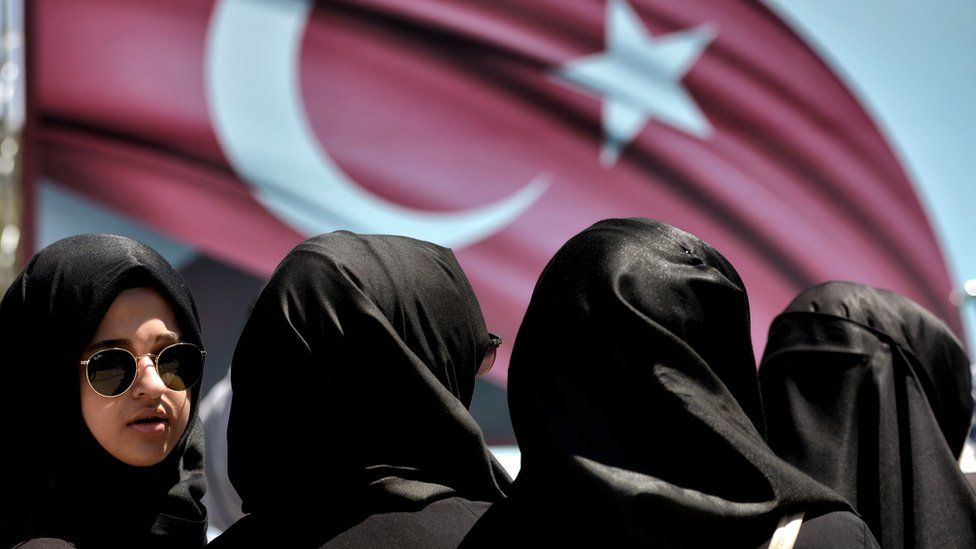Reina attack highlights widening chasm in Turkish lifestyles
- Published

Hours after the Reina nightclub attacker was caught in Istanbul this week, the Turkish government's press office sent out a tweet, quoting President Recep Tayyip Erdogan.
"I served as PM of Turkey for 14 years," it said. "People's life style has never been interfered with and will not be henceforth."
It was a repetition of what the president had said in his first speech after the New Year's Eve attack - "Nobody's lifestyle in Turkey is under systematic threat. I ask the liars saying it: who interfered with your food or drink or clothes?"
Mr Erdogan was responding to allegations that his Islamist-leaning government fostered a climate in which non-Muslim celebrations and alcohol-fuelled parties could be targeted.
In the run-up to the Reina attack, posters and pro-government newspapers carried pictures of a Santa Claus figure being punched and warnings not to celebrate New Year.
In the end, Reina appears to have been targeted as a high-profile location full of tourists, rather than because of what it represented. But the attack has revived a debate over whether Turkey's secular side feels threatened by its pious one.
More on the Reina attack
The narrow streets of Asmali Mescit in central Istanbul were once teeming with nightlife. Alcohol flowed and music played late into the night. Today, most bars have closed down or are largely empty.
It's partly because of the security threat, as the number of foreign tourists plummets and Turks fear venturing out, but also partly because of government restrictions on alcohol.
Under strict laws passed in 2013, an alcohol-licensed bar must be more than 100 metres from a school or a mosque and bars can no longer have tables outside.
"The whole system is geared around impossible regulations so we can't renew our alcohol licence," said bar-owner Kamil Erturk. "They come and say 'your bar stools are too high' or 'if you're a restaurant and people dance after dinner, you're violating your licence'." Mr Erturk had to close his second bar because his alcohol licence was revoked.
"When Erdogan says nobody's lifestyle is under threat, I can only laugh bitterly," he said. "It's not just alcohol, we feel the pressure in every sphere. They manipulate public opinion through the media and online trolls. Anyone who wants to lead a different life is under threat."
Turkey's secular-religious divide has always existed. The Turkish Republic founded by Ataturk in 1923 aimed to look westwards, with a secular constitution and strict control of religion, which for decades ostracised the conservatives.
When Mr Erdogan came to power in 2003, he appeared to bring together the two wings, revoking a decades-long ban on women's headscarves in public institutions but at the same time winning support from many liberals.
'Crime against humanity'
But the expanded middle class that emerged under his rule clamoured for more, and his spirit of inclusiveness cracked. Nationwide anti-government protests in 2013 sparked by development plans on Istanbul's Gezi Park were the tipping point.
"Most of us in the park were saying 'stop meddling with how I want to lead my life'," said one of the protest organisers, who was afraid to give his name - an indication in itself of how Turkey has changed.
He went on: "Erdogan was saying women should have at least three kids and there was growing pressure on secular institutions. When it came to asking for more democracy - or true democracy - they said we were separatists or detrimental to society."
From the former deputy prime minister telling women not to laugh in public, to Mr Erdogan calling anybody who drinks "an alcoholic" or rejecting mixed-sex university dormitories, the lifestyle rhetoric has hardened, emboldening the conservatives.
A woman wearing shorts was recently beaten on a public bus; a party in a record shop during Ramadan was attacked by local Islamists; and pro-government newspapers blast out headlines against secularism or leftists. There's a siege mentality in the government and a sense of two visions of the country colliding.
"We who wear headscarves were the ones who were oppressed before this government", said Elif Devecioglu, a designer of Islamic women's fashion, which has become Turkey's fifth-largest industry.
"Academics were taking 17-year-old girls into a room to persuade us not to wear headscarves. It was psychological violence… a crime against humanity. This government has the intention to represent all sides but 14 years is not a long time to change mentalities."
Much has changed in Turkey in a relatively short time, and the pious now hold power while the secularists feel under threat. But Turkey also feels dangerously polarised - a trend likely to deepen as constitutional change is disputed.
Mr Erdogan wants to appoint himself head of the executive, scrapping the prime minister and giving the president sweeping powers to appoint ministers and choose most judges. He argues, with the support of his government, that it will unburden Turkey from unwieldy parliamentary coalitions. The opposition says it'll entrench totalitarianism.
Today's Turkey faces myriad threats and challenges, and yet its response is to fracture, to deepen existing chasms in society. The country is increasingly at war with itself.
- Published3 January 2017
- Published1 January 2017
- Published2 January 2017